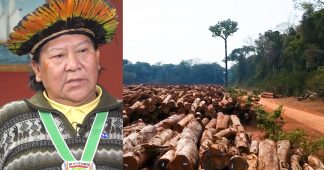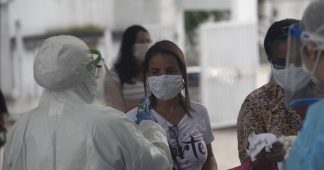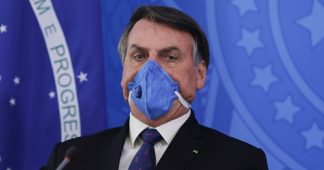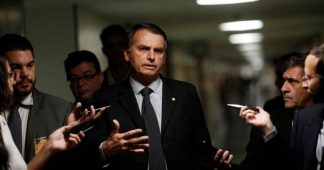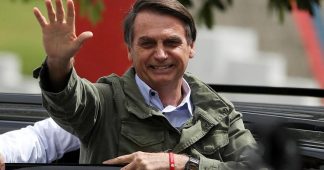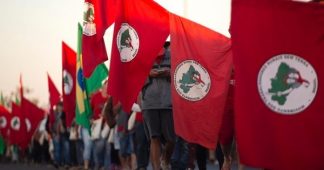May 26, 2020
As Brazil sees more than 800 deaths in 24 hours and nearly 400,000 confirmed cases, we look at COVID-19’s devastating impact on Brazil’s Indigenous peoples, who are dying at double the rate of the rest of the country. We speak with world-renowned Brazilian photojournalist Sebastião Salgado, who wrote an open letter to right-wing President Jair Bolsonaro, who called the virus a “little flu,” to warn him the pandemic is “an extreme threat to their very survival.”
Transcript
AMY GOODMAN: This is Democracy Now!, democracynow.org, The Quarantine Report. I’m Amy Goodman in New York City, one of the epicenters of the pandemic, joined by my co-host Juan González from his home in New Brunswick, New Jersey. New Jersey is the state with the second-highest number of infections. Hi, Juan.
JUAN GONZÁLEZ: Good morning, Amy. And good day to all of our listeners and viewers across the country and around the world.
AMY GOODMAN: Well, we begin today’s show with Brazil, where the coronavirus is rapidly spreading, with nearly 400,000 confirmed cases and almost 23,500 deaths, making Brazil’s outbreak the second worst in the world, after the United States. On Monday, Brazil’s daily death toll surpassed the U.S. for the first time, with 807 deaths in 24 hours. President Trump has suspended travel from Brazil to the United States, effective today just before midnight.
Despite this, right-wing President Jair Bolsonaro has continued to dismiss the severity of the virus. He’s called it a “little flu” and spoke out against lockdowns imposed by governors and mayors. Two health ministers have left his Cabinet in recent weeks over disagreements over the handling of the pandemic.
On Sunday, just as Brazil became the number two hot spot for COVID-19 in the world, Bolsonaro greeted anti-lockdown protesters outside the presidential palace. He wore and then removed a face mask as he mixed with his supporters.
PRESIDENT JAIR BOLSONARO: [translated] Are you ready? We are in Brasília now to join a spontaneous demonstration of the people for democracy, for freedom, the people who really want Brazil to move forward, freedom above all else.
AMY GOODMAN: This comes as the spread of coronavirus is devastating Brazil’s Indigenous population, who are dying at double the rate of the rest of the population of Brazil, according to advocates. The Articulation of Indigenous Peoples of Brazil says there have been at least 980 confirmed cases and 125 deaths of Indigenous people, indicating a mortality rate of 12.6%, compared to 6.4% nationally.
The city of Manaus in Brazil’s Amazon region has been hard hit by the virus, with nearly 1,200 deaths. Last week, the mayor of Manaus accused the government of Jair Bolsonaro of intentionally allowing Indigenous communities to die of COVID-19.
MAYOR ARTHUR VIRGÍLIO NETO: [translated] I fear genocide, and I want to denounce this to the whole world. We have here a government that does not care about the lives of Indigenous people. … It is a crime against humanity that is being practiced here in my state, here in my region.
AMY GOODMAN: Well, for more, we go to Paris, France, where we’re joined by the world-renowned Brazilian photojournalist Sebastião Salgado. He has also warned that the Indigenous peoples in the Amazon face genocide if the Brazilian government does not take steps to protect them from the coronavirus outbreak. Earlier this month, Sebastião Salgado wrote an open letter to President Bolsonaro warning that the pandemic represents an extreme threat to their very survival. The petition has gathered nearly 300,000 signatures. Sebastião Salgado has spent almost four decades documenting the Amazon and its people.
And it is an honor to welcome you to Democracy Now!, Sebastião. Thank you so much for joining us. Can you talk about what you see happening in your home country, in Brazil, right now?
SEBASTIÃO SALGADO: Well, Brazil now is living a very difficult moment. We have a central power, held by President Bolsonaro, that is not acting in the normal way that every country act around the world toward the coronavirus. And we have the governors of the states, the mayors of the big cities, that are taking care, putting people in quarantine. And Mr. Bolsonaro is working in the opposite way. And that’s creating an amazing destabilization of the country.
I am very concerned with the Indigenous community, mostly in the Amazonia. I just finished a bond of work where I spent seven years in Amazon. And these Indians have no immunological protection against the diseases that come out of the forest. The government knows this. Everyone knows this. And we are not taking care. We must take care to protect these Indians. The contrary will be real genocide.
JUAN GONZÁLEZ: And, Sebastião Salgado, you have said in the past that you believe that the virus is a product of the destruction of the planet’s environment. Could you elaborate on that?
SEBASTIÃO SALGADO: No, ask me again. What’s the question, exactly?
JUAN GONZÁLEZ: That in the past you have said that the coronavirus pandemic is, in part, a product of the destruction of the environment around the planet.
SEBASTIÃO SALGADO: Well, you see, we are destroying every portion of the ecosystem protectors of this planet. And we are putting the diseases, that will be possible to stay inside the protected environment, out of the environment. And that’s a very difficult moment that we are living. Probably, what is happening now in all the planet, around the world, will bring us to mind more about the environment, to come back to our planet, to protect what we have, the pristine, and to see how we can rebuild the ecosystem in order that we can live in peace with our planet, is what happens everywhere around the world.
AMY GOODMAN: Let me ask you — I wanted to turn to the chief of Tres Unidos. It’s an Indigenous village in Brazil’s Amazon rainforest, that I’m sure you know well, where the coronavirus infected people despite a lockdown to all outside visitors. At least 16 out of the village’s 106 people have tested positive for COVID-19. The virus likely came up the Rio Negro river from Manaus, which is five hours away. This is the village chief, Waldemir da Silva.
CHIEF WALDEMIR DA SILVA: [translated] This virus is treacherous. It came quietly, as if carried on the wind. We started getting ill and thought it was a bad cold, but people got worse, even after taking medicine made at home and taking antibiotics and anti-inflammatory medicine. We managed to treat the illness in a careful way.
AMY GOODMAN: If you could talk, Sebastião Salgado, about how the Indigenous people are now dealing, and how the government is dealing with them? I mean, you have this battle going on in Manaus with the mayor calling the president stupid. If you can talk about the history of the way Indigenous people are dealt with in the Amazon?
SEBASTIÃO SALGADO: You see, when Brazil was discovered, today the scientists can calculate that the population of Amazonian — Brazilian Amazonian ecosystem, we had about 5 million people living there. With the diseases come from outside, a lot of Indians disappeared. Today we have just a little bit more than 300,000 Indians living in Amazonia.
A lot of them are close to the cities, as Manaus, as Barcelos, São Gabriel, as you said. These Indians are contacted a long time, and they have more anticorps. They are more adapted for the world, human world. But one very big portion of the Brazilian tribes are quite isolated tribes. You see only Brazilian Amazonians who have a little bit more that 100 groups that were never contacted. They are completely isolated Indians. And the diseases coming inside of Amazonia can hit them.
You see, what is happening now, the danger is that Mr. Bolsonaro took all the filters to protect the ecosystem, eliminating all the institutions, weakening the institutions that protected the Amazon’s ecosystem. And he took out most of the budget of the National Foundation of the Indians. And what happens? After a while, the Amazonian protected land of the Indian territories started to be invaded by loggers, by gold diggers, by religious groups. Only in Yanomami territory in Amazonia, we have today, in this moment that we’re speaking, more than 22,000 gold diggers that are invading the territory. And these people are carrying the disease inside.
What we apply with this letter to the president of Brazil is to stop, to push out these invaders, to create a kind of barrier, sanitary barrier. People come inside the Indian territory in order to protect these tribes — to the contrary, we’ll lose them. They will disappear. They have no anticorps, antibody, to protect themselves against this disease.
JUAN GONZÁLEZ: And, Sebastião Salgado, what does it mean to have a president like Jair Bolsonaro, who basically ridicules science, doesn’t pay attention to his own health, public health, officials? Very similar to some of the stuff that’s happening here in the United States with President Trump, but even worse. What does it mean, not only for the Amazon and the Indigenous population, but for all Brazilians?
SEBASTIÃO SALGADO: You see, the big problem with President Bolsonaro, that he is destroying the Brazilian institutions. Brazil had very good institutions, cultural, health institutions, the protection of Indian territory. He’s extremist, rightist president. He is destroying these institutions. He has tried to make the Indians, that live in their territory, that are hunters, that are gatherers — they want to transform them in peasants. It’s incredible. It’s incompatible. And he is not respecting all these territories, protected by law. And that is happening every level of the Brazilian society. We are living a very difficult moment in Brazil.
AMY GOODMAN: I’m wondering if you could talk, Sebastião Salgado, on the attacks on the truth, both from the president of Brazil, Jair Bolsonaro, who is a very close ally of the president of the United States, President Trump. Both of them diminish, to the end, this coronavirus, the president of Brazil, of course, calling it a “little flu,” President Trump saying it would come to nothing, 15 cases and then zero, as opposed to what so many of the scientific advisers around him were telling him.
Now, you are famous in your work for photographing, documenting the truth of people on the ground all over the world, particularly workers, Indigenous people — your famous book, Migrations: Humanity in Transition, Workers: An Archaeology of the Industrial Age, Gold and Terra: Struggle of the Landless. Can you talk about this phenomenon that we see, if you can call lies that, the thousands of lies told by these men, that clearly take lives, and particularly of the most vulnerable?
SEBASTIÃO SALGADO: You see, we have countries. We have very poor population, countries with — more populated than Brazil, than the United States, if you take India, if you take Indonesia. These countries, they take care of the population. They had one quarantine, and they are coming out now from the quarantine with a lot of deaths, but not enormous amount as the United States, as the Brazil.
It’s exactly these two presidents that don’t care about the people. They care about money, about rentability. I put myself the question: if you are a government? We are a government for the people, your nation, your country. You are not a president just for the profit. And that is the big problem happens in this moment.
The United States has the biggest number of death before in the world by coronavirus. You are just today cross 100,000 deaths in the United States. In Brazil, because the figures are not good, we are told that you have more than 20,000 — just more than 20,000 people, because the ones that die inside the hospitals that we can identify that died by coronavirus. But the people that are dying in the slums, the people that are in the very poor areas, we don’t know of about what they are dying. The scientists in Brazil calculated that we must still have a minimum nine times more case and deaths in a Brazil than just the official figures that is presented.
JUAN GONZÁLEZ: And, Sebastião Salgado, you mentioned the thousands of gold diggers that are invading the Amazon, but there are also major multinational companies, major Brazilian companies, that are also benefiting from these policies of Jair Bolsonaro. Could you talk about who some of these companies are, so that people know?
SEBASTIÃO SALGADO: Well, the companies, yes, but, you see, Bolsonaro was elected by the agrobusiness in Brazil and by the sectarian religions — religious groups. And he has opened the Amazonian territory mostly for farmers, for loggers, for gold diggers. You see, we spoke a lot last year about the fires in Amazonia in last July, August. This year will be worse. We are destroying the forest in a very high speed. And while destroying everywhere around Amazonia, these farmers, they are growing the space by the incentive of the president.
The companies, of course that they are there. They are trying to get what they can have in this government. But the big problem is the populism of Mr. Bolsonaro, that he wanted to have voters that have his mind in the new elections. And he’s giving Amazonia for the people that want to invade it. And you have hundreds of thousands invading in Amazonia. As I said a few minutes ago, only gold diggers inside Yanomami territory, we have more than 22,000. But you have loggers going inside everywhere, farmers destroying the forest everywhere. It’s a general problem, and it’s not just specific of big companies. They are also inside of the problem. But the biggest problem is the populism of the president.
AMY GOODMAN: If you can talk about this Reuters report that says that the Brazilian environment minister, Ricardo Salles, called on the government to push through further deregulation of environmental policy while people are distracted by the coronavirus, in a video the Supreme Court ordered released? The video of the ministers’ meeting surfaced in an investigation of whether President Bolsonaro interfered in appointing leaders of the Federal Police for personal gain. During the meeting, other ministers spoke, including Salles, with environmental groups saying his remarks prove Bolsonaro government is systematically seeking to dismantle environmental protections.
SEBASTIÃO SALGADO: You see, we have enough happened in Brazil to have an impeachment of this president. Everything that the ministers are doing, they are doing in the way to take the power. They are doing every weekend, in the meetings that they do in Brazil, a proposition to have the power in their hands, out of the democratic way. They are applying for a coup d’état. And, you see, we are living a difficult moment, because how you can do an impeachment during this big problem of coronavirus? Who will you be putting in place? How will you be having new elections in a moment like this? And they are profiting. They are taking profit for themselves in order to made more large their power.
The example you just gave a few minutes ago, the minister of environment, Mr. Salles, doing the proposition that just in this moment that you are completely toward the coronavirus was the moment to push all the destruction of the law system that protects the Indian community, that protect the environment, that protect the destruction of the rainforest. He tried to destroy all this now in order to create a total destabilization in the order in Brazil.
Brazil has a fantastic system of law. The National Foundation of Indians is one amazing institution. Who directs the National Foundation of Indians now? It’s no more an anthropologist like always was, a scientist like always was. Now it’s a cop. It’s a policeman that is directing the National Foundation of Indians. National Foundation of Indians now is not acting more for the Indians; they are acting for the farmers. The order is completely reversed in Brazil.
JUAN GONZÁLEZ: And, Sebastião Salgado, you’ve said, clearly, that the key role that farmers are playing, Brazil is a big exporter of agricultural products. What kind of pressure could governments around the world exercise on Brazil? Do you support sanctions against the Bolsonaro government to make them take the necessary steps to protect Indigenous communities?
SEBASTIÃO SALGADO: I believe that the political sanctions, the political pressure. Brazil is very sensitive for outside of the country. Brazil is a big exporter of raw material. And I believe that we can do pressure. I don’t apply to do interdiction of importation of Brazilian goods, because the Brazilians need to live. I’m not applying from this. But I am applying for the political pressure in companies that invest in Brazil, that they put umbrellas in their investment, that they take care of the environment, that they accept to finance in Brazil if the Brazilian — the Brazilian government respect the minimum of the environment that is not happening in Brazil now. I believe that the pressure must be [inaudible] the political and economical pressure.
AMY GOODMAN: Sebastião, can you talk about Messias Martins Kokama, an Indigenous leader in Parque das Tribos, a region of Manaus state made up of 3,000 people from at least 37 different ethnic tribes? He died of COVID-19 earlier this month. This is local Indigenous resident Vanderlecia Ortega dos Santos wearing a mask that says “Indigenous lives matter.”
VANDERLECIA ORTEGA DOS SANTOS: [translated] Here, we still have this dream of quality education and health, because we have not yet been provided with assistance. His death is also representative of what’s lacking, a lack of healthcare, of what’s missing for those Indigenous who live in the city.
AMY GOODMAN: If you can talk about this area, Manaus? And talk about what has happened to the people, as well, and what you’re calling for in this letter, signed by 300,000 people, that has gotten a tremendous amount of attention. Among the people who have signed it are Oprah Winfrey and Madonna, Naomi Campbell, the author Mario Vargas Llosa, the artist Ai Weiwei, actress Meryl Streep, Brad Pitt and others.
SEBASTIÃO SALGADO: Well, our hope — this letter was not directed exclusive to the president of Brazil. We directed this letter to the legislative — to the executive power, the president, to the legislative power and to the judiciary power. We are applying these three powers to aid us — it’s a humanitarian letter. We are not made any political attack toward the government of Mr. Bolsonaro. We are applying for a humanitarian actor to protect these tribes.
You see, Amy, in Amazonia in Brazil, we have these Indians, as I said a few minutes ago, that were never contacted. These Indians are the prehistory of the humanity. We are a species that are living with the prehistory of — we are living with our past inside Amazonia, and we are in total danger to lose all this population now. And the coronavirus multiply very fast if they go inside this community. These communities are linked one to each other, and will be very complicated. We are applying to protect these more isolated groups, to create a barrier, to not — to take out the invaders and create a barrier, not allow the people come inside this territory for a while, to protect this population.
The reply in Brazil of this petition, of this letter, was very, very good. We have all Brazilian press. We have all the newspapers that gave the notice. And we are having — we continue to have meetings with the judges, with all the group of the judicial system in Brazil, to see if we can create this humanitarian protection for the Indians.
AMY GOODMAN: Finally, Sebastião, if you could comment more broadly on the future of Brazil? You fled Brazil in 1969. You fled the military dictatorship there. You went to Paris. If you can talk about the future of Brazil and also your own time now? Just like we here are sheltering in place in the United States, you have, too. I last saw you years ago when we had this amazing conversation in New Mexico, a public conversation with Eduardo Galeano, as well, you may remember. And you were talking about your son then, but you’re living with your son with Down syndrome. You’ve written about that, as well. It’s a lot of questions there: the future of Brazil to what you’re doing now.
SEBASTIÃO SALGADO: You see, Amy, Brazil, when I was a child in Brazil, we had more than 90% of Brazilian population that were rural population. Now we must be more than 90% urban population. In very few — in a few decades, four, five, six decades maximum, we made what you in the United States and the Europeans made 300, 400 years to urbanize. And we have a lot of problems that were linked to this massive movement of population toward the urban sector in Brazil.
Brazil, we had a dictatorship in Brazil. Today we have a democratic system. And we are in evolution. It’s not easy, the things happening in Brazil. We are one of the biggest countries in the world. It’s one of the fifth population in the world, one of the fifth biggest countries in the world. Brazil is an important country. And I have a big hope that the disaster that we are living now with Mr. Bolsonaro is just temporary, that this is just a step in our evolution, that we can become a real collaborate socially in the economic country.
AMY GOODMAN: And finally, you’re living in Paris right now, sheltering in place like we are, and you spending more time with your son.
SEBASTIÃO SALGADO: Yes, I live here. We came to Paris, as you said, in 1969. I came here in this time I were an economist. I came here to prepare a Ph.D. in economics. And we stayed here during the dictatorship. And we have a Down syndrome child that’s born here, that grows here. And I became a photographer here. I travel all over the world. We work a lot in Brazil. The farm of my parents, we transform in a national park. This farm, the rainforest was completely destroyed. With Lelia, my wife, we replanted this forest. We planted now more than 2,700,000 trees. We created one of the biggest environmental institutions in Brazil. And we keep working, we keep going in Brazil, and live in part in France because my profession of photographer. I developed here, but I keep working environment in Brazil. We are in Brazil all time.
AMY GOODMAN: We want to thank you so much for being with us, Sebastião Salgado, world-renowned Brazilian photojournalist, who has spent almost four decades documenting the Amazon and the people who live there. Salgado has been a UNICEF goodwill ambassador since 2001, has traveled to more than a hundred countries for his photojournalism, some of which has been compiled in his books, including Migrations: Humanity in Transition and Workers: An Archaeology of the Industrial Age, Gold and Terra: Struggle of the Landless.
We will also link to that conversation that we had together back in 2000 in New Mexico, a conversation I had with Sebastião Salgado and Eduardo Galeano, the great Uruguayan writer, who has since passed.
This is Democracy Now! When we come back, we go to New Zealand. As the U.S. deals with the greatest catastrophe in history, we look back at one of the earliest lockdowns, that has largely succeeded in eliminating the coronavirus. It happened in New Zealand under the leadership of Prime Minister Jacinda Ardern. Stay with us.
